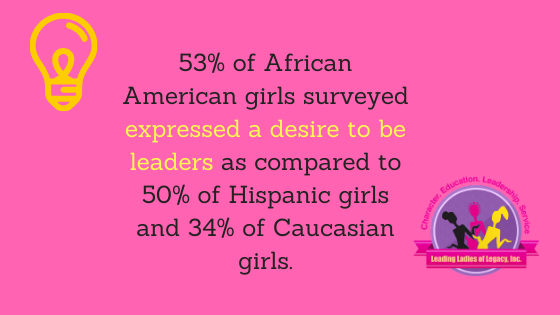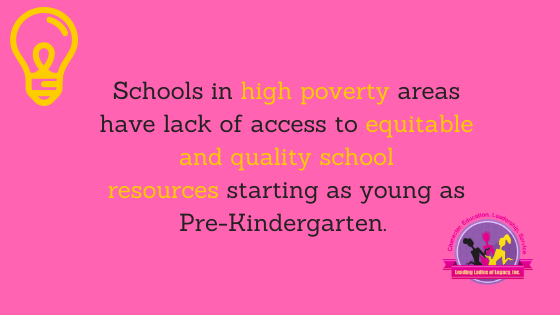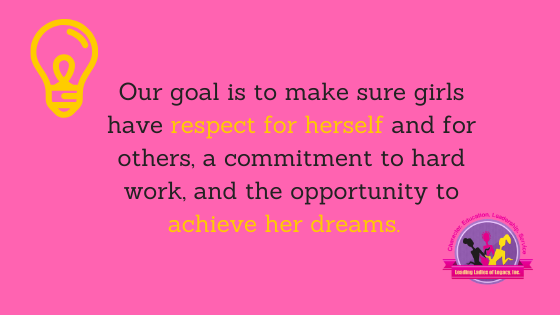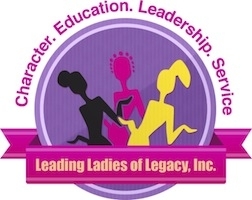The Need
Many African American girls and women face significant barriers to educational achievement. One important barrier is the prevalence of stereotypes that adversely impact the educational experience of African American girls.
Today, education is perhaps the most critical function of state and local governments. It is required to perform our most basic public responsibilities, even service in the armed forces. It is the very foundation of good citizenship. Today it is a principal instrument in awakening the child to cultural values, preparing her for later professional training, and helping her adjust to her environment. These days, it is doubtful that any child may reasonably be expected to succeed in life if she is denied the opportunity of an education.

STEREOTYPES AND SELF-ESTEEM
While negative racial and gender stereotyping and perceptions are not the sole reasons for poor educational outcomes, they unquestionably impose significant barriers to academic achievement for African American girls.
In a recent study of African American girls in New York City, the girls who had a strong racial identity — e.g., those who described themselves as “strongly in touch with their racial heritage” or “Afrocentric” — were more likely than others to say that they were happy on a typical day, to indicate a serious commitment to their schoolwork, to get good grades, and to express a desire to go to college.
They were also more likely to believe that they would ultimately achieve their goals (64 percent versus 21 percent) and have healthy relationships.
Evidence also suggests that positive messages and support from parents, other influential adults, and peers can support the development of positive race and gender identities and mitigate some of the effects of racism.
Stereotypes of African American girls and women dating back to slavery — such as the view that African American women are “angry” or “aggressive,” and “promiscuous” or “hyper-sexualized.”
Such racial and gender stereotypes shape educators’ and administrators’ views of African American female students in critically harmful ways.
This implicit bias is rarely discussed or acknowledged and goes virtually undetected. But addressing it is essential, as it can lead to lower academic expectations for African American girls, significant discipline disparities, and a higher rate of referrals to the juvenile justice system, all factors pushing African American girls out of school.

AFRICAN AMERICAN GIRLS AND LEADERSHIP
According to a recent survey, African American girls aspire to be leaders more than any other group of girls. Fifty-three percent of African American girls surveyed expressed a desire to be leaders compared to 50 percent of Hispanic girls and 34 percent of Caucasian girls. Yet “leadership opportunities are scarce” for girls, even today.
Ultimately, educators’ perceptions of African American young women often involve racial and gender stereotypes —which undermines their potential for success —so it is imperative that African American girls access programs that foster their self-esteem and provide them with meaningful leadership opportunities.

HIGH POVERTY SCHOOLS AND RESOURCES
Emerging research shows a strong correlation between attending high poverty, racially isolated (high minority) schools, and lack of access to equitable and quality school resources. Research shows that concentrated poverty magnifies issues associated with poverty in general, including dysfunctional and poorly resourced schools.
High-poverty schools have fewer resources than other schools and have more difficulty recruiting and retaining qualified and experienced teachers. And resource inequities begin as early as pre-kindergarten.

OUR SOLUTION
Girls group mentoring programs can make their spaces safe and welcoming to racialized girls by:
- Creating a space where girls can voice their experiences and discuss their representation and identity.
- Utilizing the group to challenge stereotypes through discussion and analysis of the media.
- Taking part in community and advocacy projects to encourage the media to represent racialized girls better and reflect their diversity.
- Finding mentors from within their community so that girls can see themselves reflected as leaders in the program. This can be particularly valuable for bridging cultural or racial gaps between the girls and staff.
- Matching girls with diverse ethnicities, countries of origin, and family backgrounds can allow girls to learn more about one another.
- Support a strengths-based group culture of acceptance and support. Create a safe space for girls to share their feelings and feel validated. Reinforce group values that create this space from the outset and invite girls to come forward with serious issues.
Our girl’s group mentoring programs will create safe spaces girls need to explore, learn, and grow.
 [/vc_column_text][/vc_column][/vc_row
[/vc_column_text][/vc_column][/vc_row
]
